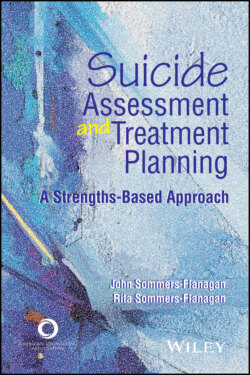Читать книгу Suicide Assessment and Treatment Planning - John Sommers-Flanagan - Страница 56
Confidentiality and Its Limits
ОглавлениеWhen clients, students, or others in distress talk with mental health or school counseling providers, they usually assume that what they say will be held in confidence. This is mostly true, but confidentiality exists only when a formal professional relationship has been established. For example, if teachers contact you about student behavior or parents contact you and offer information about their child, you may or may not be required to hold that information confidential. These are situations when you should spell out limits of confidentiality in advance, before inaccurate assumptions take hold.
It is up to you to explain what you can and will keep confidential and what you cannot keep confidential. Intent to harm oneself or others is an almost universal reason for mental health, health, and school professionals to break confidentiality. Some professional ethics codes directly or indirectly allow for maintaining confidentiality when clients are terminally ill and may be considering ending their lives (Werth et al., 2002). Technically, such plans and considerations would be labeled “suicidal,” but this is a vastly different situation than the ones we are writing about in this book. State laws, ethics codes, agency policies, and school rules dictate or influence what can and cannot be held in confidence. You should practice presenting information about confidentiality and its limits accurately, in understandable language, to clients, parents, teachers, administrators, and other community or school professionals (e.g., police officers). Here is an example aimed at an adolescent population:
As your counselor, I will keep nearly everything you tell me private. We call this confidentiality. This is important for a trusting relationship. For example, if we see each other in public, I’ll be careful not to greet you unless you greet me first, because the fact that you’re seeing me for counseling is nobody else’s business. That’s how private this relationship is. But there are a few exceptions we should talk about.
1 Your parents. Your parents have a right to ask for my counseling records. That doesn’t mean I’m going to tell them everything you say, but they can ask to see my notes. Most parents don’t ask to see my notes because they agree that what you and I talk about should be just between us. We will work together on reaching an understanding with your parents so we both know what to expect. If your parents, friends, or others tell me things about you that will help in our counseling, I will let you know. They’re important people in your life, but they’re not my clients. I won’t keep secrets for them, and I’ll make that clear to them if they speak with me.
2 Danger. If what we talk about leads me to believe you’re in danger of hurting yourself or someone else, by law I have to act to keep you or others safe. But the first thing I would do is talk directly with you about how to do that. If I believe it’s necessary to call someone, I will make every effort to tell you first. My most important priority is to help you. If you’re in danger, I may need to contact others to help keep you safe.
3 Abuse. If I suspect that you, or anyone, is being abused, the state requires that I make a report to child protective services. This could involve sexual abuse, physical abuse, or neglect. If I suspect this, I’ll ask you about it directly and then I’ll tell you if I need to make a report.
4 Questions. Do you have any questions about your privacy or confidentiality with me?
There are other reasons why counselors breach confidentiality, such as for insurance paperwork or court orders, but these details are typically addressed in written informed consent documents.
